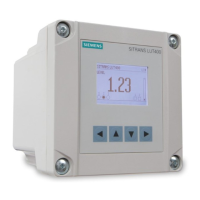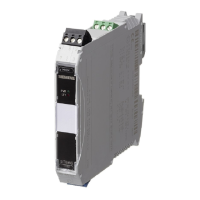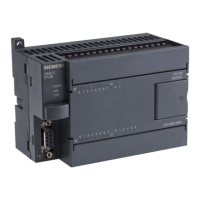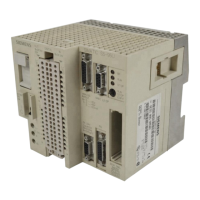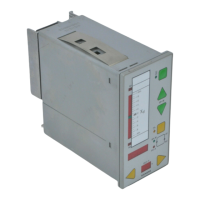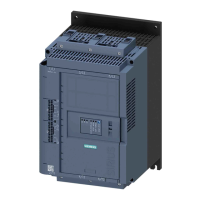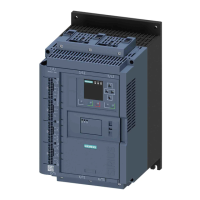Do you have a question about the Siemens SITRANS LUT400 and is the answer not in the manual?
This manual helps set up the SITRANS LUT400 for optimum performance. It applies only to the SITRANS LUT400 series.
Explains the meaning of symbols used in the manual and on the product for safety and operational guidance.
Details manual and on-product safety marking symbols and their descriptions for proper handling and installation.
Provides US installation compliance information for Federal Communications Commission (FCC) rules, including Class A digital device limits.
Highlights key features of the SITRANS LUT400 series controllers, including enclosure size, LUI display, relays, and communication options.
Describes the three different models of the SITRANS LUT400 available: LUT420, LUT430, and LUT440, detailing their functionalities.
Provides guidelines for selecting optimal mounting locations, considering ambient temperature, access, cable length, and vibration.
Details specific mounting instructions for wall, panel, pipe, and DIN-rail installations, including component identification.
Provides instructions and cautions for accessing the wiring compartment and making electrical connections to the SITRANS LUT400.
Details AC and DC power connection requirements, including safety warnings and protection measures.
Explains specifications for transducer cables and provides warnings regarding hazardous voltage and incorrect connections.
Describes the easy-to-use commissioning process using the device's LCD and local push buttons (LUI).
Guides the user through the initial power-up and language selection process for the SITRANS LUT400 device.
Explains the step-by-step Quick Start (QS) procedures for configuring applications like level, volume, and flow.
Details initial measurement setup parameters for the SITRANS LUT400, including sensor mode, units, and calibration points.
Explains the functionality of the SITRANS LUT400 relays for controlling external devices like pumps and alarms.
Covers the configuration of various alarms including level, temperature, flowrate, and fail-safe conditions.
Describes the pump control functionality, including algorithms, setpoints, and interlock configurations.
Details using SIMATIC PDM software for commissioning, monitoring, and troubleshooting HART devices like the SITRANS LUT400.
Explains how to use the web browser interface for monitoring and adjusting SITRANS LUT400 parameters via USB.
Describes using AMS Device Manager software for commissioning and maintaining SITRANS LUT400 and other process devices.
Introduces the Wizards feature, grouping settings for specific functionalities like QS Level, QS Volume, QS Flow, and Pump Control.
Covers setup parameters including sensor configuration, calibration, rate settings, and fail-safe parameters.
Details calibration parameters such as Low Calibration Point, High Calibration Point, Sensor Offset, Near Range, and Far Range.
Explains fail-safe parameters that ensure devices default to a safe state when reliable readings are unavailable.
Covers current output functions, mA setpoints, limits, and manual value settings for analog output.
Details volume calculation features, including vessel shape selection, units, and breakpoint entry.
Covers pump control setup, including enable/disable, relay assignment, control modes, and setpoints.
Explains the configuration of various alarms like high/low level, temperature, flowrate, and discrete input alarms.
Covers identification parameters like TAG, Long TAG, Descriptor, and serial number for device management.
Details diagnostic functions including Echo Profile, Trend, Master Reset, and viewing log files.
Provides information on device/sensor lifetime monitoring, maintenance schedules, and reminder settings.
Instructions for updating the SITRANS LUT400 firmware using the provided installer via USB.
Step-by-step guide for safely replacing the device's internal battery, including necessary precautions.
Covers common issues related to HART and USB communication, providing steps to resolve them.
Lists general fault codes, their meanings, and corresponding corrective actions for diagnosing device errors.
Provides a troubleshooting guide matching symptoms to possible causes and recommended actions for common issues.
Addresses issues related to acoustic or electrical noise affecting readings, with methods to determine and reduce noise sources.
Details the power specifications for AC and DC models, including voltage, VA, and fuse ratings.
Lists performance specifications such as measurement range, accuracy, resolution, and reference conditions.
Describes the device's interface capabilities, including analog mA output, relays, discrete inputs, and programming options.
Provides mechanical specifications for the enclosure, including dimensions, IP rating, and material.
Details mechanical specifications for the remote display lid, including dimensions, IP rating, and material.
Specifies environmental conditions for operation, including location, altitude, temperature, and humidity.
Lists applicable general and hazardous area approvals for the SITRANS LUT400 device.
Provides detailed dimensional drawings of the SITRANS LUT400 enclosure, back mount bracket, and cable entry.
Specifies the cutout dimensions required for mounting the remote panel mount model.
Explains the operational principles of the SITRANS LUT400, highlighting its ultrasonic technology and echo-processing software.
Details the echo processing techniques including enhancement, true echo selection, and selected echo verification.
Explains Near Range and Far Range parameters used to define the area ignored or included in measurement.
Describes the mA output functionality, its proportionality to material level, and scaling options.
Explains the variety of volume calculation features, including preset shapes and universal volume calculations.
Details flow calculation methods, including standard routines and universal calculations based on head/flow breakpoints.
Provides contact information for technical support via request, internet service, and personal contact.
Offers comprehensive support solutions and documentation access through Siemens' online portal.
| Brand | Siemens |
|---|---|
| Model | SITRANS LUT400 |
| Category | Controller |
| Language | English |
